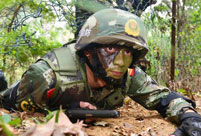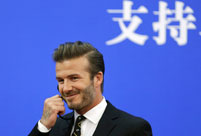 10 low-carbon tips to save money
10 low-carbon tips to save money
 Luxury cars make Asia premiere at Auto China
Luxury cars make Asia premiere at Auto China
 Versatile dog
Versatile dog
 Ni Ni covers BAZAAR JEWELRY
Ni Ni covers BAZAAR JEWELRY
 Cherry blossoms reach peak bloom in Washington D.C.
Cherry blossoms reach peak bloom in Washington D.C.
 Top Chinese fashion icons in foreigners' eyes
Top Chinese fashion icons in foreigners' eyes
 Asia's largest business aviation exhibition to be held in Shanghai
Asia's largest business aviation exhibition to be held in Shanghai
 World's top-rated luxury hotels
World's top-rated luxury hotels
 Wu Jing, Xie Nan to hold wedding on May
Wu Jing, Xie Nan to hold wedding on May
 London Cake International attracts tourists
London Cake International attracts tourists
MOSCOW/WASHINGTON, April 22 -- Top Russian and U.S. diplomats on Tuesday agreed to continue communicating over the Ukraine crisis, but remained deeply divided on how to defuse the situation.
Russian Foreign Minister Sergei Lavrov and U.S. Secretary of State John Kerry spoke over phone for the second time in two days in a bid to put a lid on the simmering tensions in the east of the Eastern European country.
The two conferred on the deployment of Organization for Security and Cooperation in Europe (OSCE) observers and explored other possible measures, the Russian Foreign Ministry said in a news release, adding they agreed to maintain communication on the issue.
However, the two global heavyweights are far from being on the same page, with Kerry voicing "deep concern" over what he called a "lack of positive Russian steps."
The U.S. State Department said Kerry told Lavrov that "mounting evidence" shows that pro-Russia separatists were continuing to "increase the number of buildings under occupation and take journalists and other civilians captive."
"He urged Russia to tone down escalatory rhetoric, engage diplomatically in the east with the OSCE and Ukrainian government, and issue public statements calling for those occupying buildings to disarm and stand down in exchange for amnesty," said a senior official with the department.
Kerry also "reiterated that the absence of measurable progress on implementing the Geneva agreement will result in increased sanctions on Russia," added the official.
For his part, Lavrov stressed that Ukrainian authorities should take action as soon as possible to implement the Geneva deal and revoke the order to use military forces against civilians, said the Russian Foreign Ministry.
He also called on Kiev to disarm extreme nationalistic militants, release detained protesters and embark upon constitutional reform, according to the ministry.
As to the threat of sanctions, Lavrov said Monday that Washington should stop threatening Russia with sanctions over events in Ukraine while turning a blind eye to "atrocities" carried out by Ukrainian militants.
Any attempt to isolate Russia was bound to fail, as "isolation has never led anyone to anything," Lavrov told reporters after talks with Mozambican counterpart Oldemiro Baloi.
The United States, Russia, Ukraine and the European Union signed a statement in Geneva on April 17, urging all sides to refrain from violence, intimidation or provocative actions as part of initial steps to restore order in Ukraine.
The West and Kiev have repeatedly blamed Moscow for inciting the unrest and splitting the country, which was denied by Russia.
 Commando elite specializes in sign language
Commando elite specializes in sign language Man photoshops himself into girlfriend's childhood photos
Man photoshops himself into girlfriend's childhood photos Photo story: Stallholders at Beijing Zoo Wholesale Market
Photo story: Stallholders at Beijing Zoo Wholesale Market Artists on backstage
Artists on backstage Beckham launches fund to support youth soccer in China
Beckham launches fund to support youth soccer in China Cherry blossoms hit peak bloom in Washington D.C.
Cherry blossoms hit peak bloom in Washington D.C. Children in ancient costumes learn Zhusuan
Children in ancient costumes learn Zhusuan Tens of thousands celebrate Water Splashing Festival
Tens of thousands celebrate Water Splashing Festival A bite of China II whets the appetite
A bite of China II whets the appetite Richest Chinese of 2014: half from the mainland
Richest Chinese of 2014: half from the mainland Chengdu - laid-back lifestyle makes happiest city
Chengdu - laid-back lifestyle makes happiest city The backstage of the Fashion Week
The backstage of the Fashion Week College students in Han costumes
College students in Han costumes Postgraduate works as waitress
Postgraduate works as waitress Life in a Lahu village in Yunnan
Life in a Lahu village in YunnanDay|Week|Month